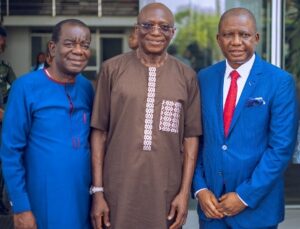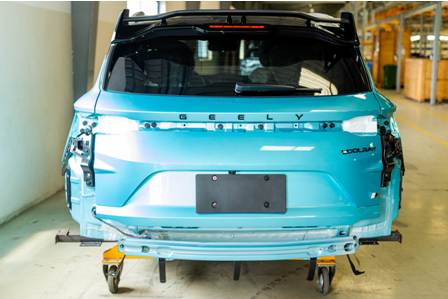ROTIMI ASHER
The National Automotive Design and Development Council and Nigeria House of Representatives’ Committee on Trade and Industry on Thursday paid a familiarization visit to Coscharis Motors’ Assembly Plants.
Aimed at protecting investments by legislation and helping the nation’s auto assemblers to drive up volumes for the locally assembled vehicles, the visit, which commenced with Coscharis Motors was extended to other Lagos-based assembly plants, including Dangote Sinotruk West Africa.
Standing in for the NADDC helmsman, the Director, Research, Design, and Development of the Council, Engr. Dr. Fidelis Achiv emphasized the need for Nigeria assembly plants to patronize local manufacturers producing high-quality components that meet international standard as a way to boost local content, instead of relying on international source.
“We encourage these plants to adopt the local content program. Unfortunately, low after-sales demand hampers production capacity. If demand were higher, production lines would likely operate at full capacity, necessitating market expansion efforts.
We’ve supported these companies and will continue to do so, but they must also take initiative to explore new markets with competitive interest rates” he said.
Speaking after touring of Coscharis Plant, the Chairman, House Committee On Industry, Enitan Dolapo-Badmus stressed: ‘’The purpose of embarking on the tour was to see how the House Committee can assist Coscharis Motors and other local assemblers convince Nigerians to stop patronizing used cars popularly called ‘Tokunbo’ which on the long run may be more expensive than brand new vehicles.

Hon. Dolapo questioned the use of local assemblers’ huge investments on big expanses of land for assembly plants making vehicles that are not being patronized by Nigerians.
“Definitely, they have to sell to over 200 million Nigerians not only to the government,” he pointed out, adding, “Government alone cannot increase the volume of vehicles assembled by these companies.
“So, how do we dissuade Nigerians from buying used cars? What we suggest is that there must be legislation. Every side has to bend, including those who are running assembly plants.
“You can’t say somebody who is trying to survive should buy a brand new vehicle. It doesn’t come cheap, but there is need for a vehicle buying payment plan enabling a Nigerian to buy on credit at a single digit with a four-year plan. By so doing, we can encourage patronage. Let’s leave Nigerian banks out of it. You can’t ask me to pay 28% or 35% interest rate on a N20 million vehicle. It won’t work.’’
According to Hon. Dolapo, the only way forward is for the auto assemblers and National Assembly to come up with a scheme that will run for four years.
“At the end of the day,” he stressed, “what they have to guarantee is that their money comes out. Once that is sorted out, the rest is easy.”
Asked if it can work without the passage of the National Auto Industry Development Plan (NAIDP) bill into law, he said: “Automotive policy does not tell average Nigerians to buy new cars from Coscharis or other assemblers. It deals with the assemblers. The law is better, because it makes the atmosphere conducive for the assembly plants to fly but something must be done for consumers to buy the vehicles.”
Also speaking on the House Committee’s visit, Coscharis Group Managing Director, Mr. Josiah Samuel described the objective of the NADDC and the House Committee’s visit as a novel and commendable idea.
He said: “As stated by the Chairman, the visit was aimed at finding a way to further support local assemblers. I think it is novel and noble considering what has become of the auto policy.
“Like you may know, originally, the policy was meant to curtail and gradually reduced the importation of used cars as well as offering Nigerians auto finance scheme at single digit interest rate, something that would have helped to incentivize those who want to buy cars.
“This was altered by the amendment in the 2020 Finance Act, which has since reduced the levies on import from 35% to 20%, an action that further discourages local production.’’
According to Mr. Samuel, while the Coscharis Assembly facility, which features a multi-model production line assembly, has progressed from Semi-Knock-Down (SKD) to Complete Knock-Down (CKD) assembly, utilizing an automated cradle.
“Established in 2013 under Ford Motor Company’s guidance, we manufacture the Ford Ranger SUV and other brands,” he recalled, adding, “Our dismantling capabilities are unmatched.”
©Copyright MOTORING WORLD INTERNATIONAL. All rights reserved. Materials, photographs, illustrations and other digital content on this website, may not be reproduced, published, broadcast, rewritten or redistributed in whole or in part without prior written permission from Motoring World International
Contact: editor@motoringworldng.com





